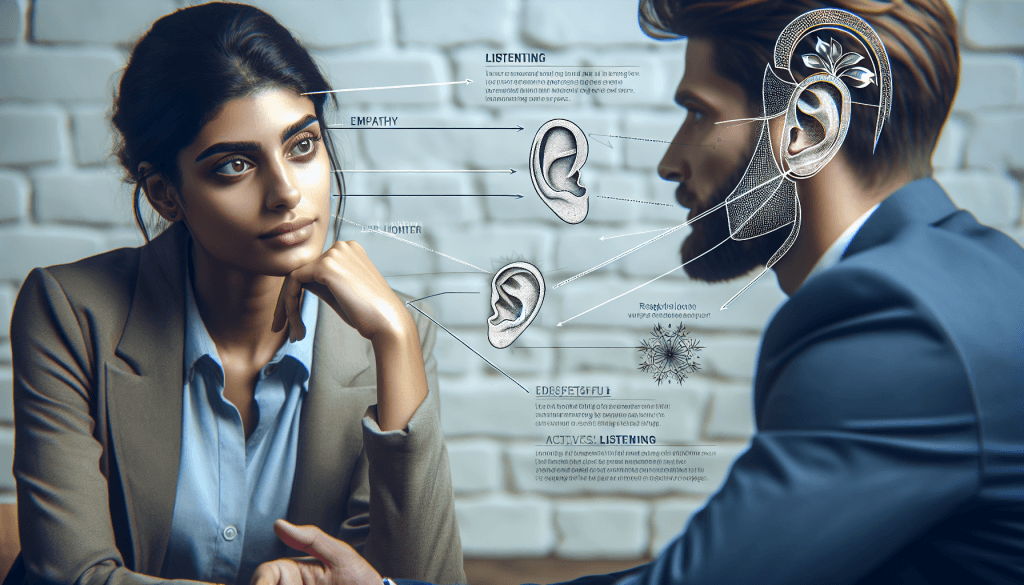The Importance Of Being A Good Listener
Listening is more than just hearing words; it’s about truly understanding and connecting with others. Being a good listener can transform relationships, improve communication, and even help you grow as a person. But why is this skill so vital, and how can we all get better at it? Stick around, and let’s dive into the art and science of listening—it might just change the way you see conversations forever.
Key Takeaways
- Listening is a cornerstone of effective communication and meaningful relationships.
- Good listeners create safe spaces, show empathy, and focus on understanding.
- Developing listening skills can improve trust, problem-solving, and personal growth.
- Overcoming biases and distractions is key to becoming a better listener.
Introduction to the Importance of Being a Good Listener
Definition of Listening and Its Role in Communication
Listening is the act of actively focusing on what someone is saying, both verbally and nonverbally. It’s not just about hearing sounds; it’s about processing, understanding, and responding thoughtfully.
In communication, listening is the glue that holds conversations together. Without it, misunderstandings and conflicts can arise. Think of listening as the foundation of a sturdy bridge—without it, the connection crumbles.
Overview of Active vs. Passive Listening
There’s a big difference between active listening and passive listening. Passive listening is when you hear someone but don’t fully engage. It’s like nodding along while your mind is elsewhere.
Active listening, on the other hand, is intentional. It involves maintaining eye contact, asking questions, and showing genuine interest. It’s the secret sauce to meaningful conversations.
Why Being a Good Listener Matters in Personal and Professional Relationships
Good listening fosters trust and understanding. In personal relationships, it shows you care. In professional settings, it can lead to better teamwork and problem-solving.
Imagine a friend venting about a tough day. If you’re distracted, they might feel dismissed. But if you listen intently, they’ll feel valued. The same applies at work—listening can make or break collaboration.

Characteristics of Good Listeners
Creating a Safe Environment for Open Communication
Good listeners make people feel comfortable. They don’t interrupt or judge, creating a space where others can speak freely.
Reserving Judgment and Suspending Preconceptions
Listening without jumping to conclusions is crucial. Prejudging someone’s words can lead to misunderstandings. Instead, approach conversations with an open mind.
Responding with Nonverbal Cues
A nod, a smile, or maintaining eye contact can say, “I’m here, and I’m listening.” Nonverbal cues are powerful tools for showing engagement.
Listening to Understand Rather Than to Reply
Many people listen just to respond. But great listeners focus on understanding the speaker’s perspective. It’s not about having the perfect reply—it’s about truly “getting” what they mean.
Connecting Emotionally Through Empathy
Empathy is the heart of good listening. It’s about putting yourself in someone else’s shoes and feeling what they feel. This emotional connection deepens relationships.

Benefits of Being a Good Listener
Strengthening Relationships and Building Trust
When you listen well, people feel heard and respected. This builds trust, whether it’s with a friend, partner, or coworker.
Enhancing Problem-Solving and Conflict Resolution Skills
Listening helps you understand problems from all angles. This makes it easier to find solutions and resolve conflicts.
For example, in therapy, listening is a cornerstone of effective communication. Learn more about its role in psychotherapy.
Improving Personal and Professional Growth
Listening exposes you to new ideas and perspectives. This can help you grow as a person and excel in your career.
Encouraging Open and Honest Communication
When people know you’re a good listener, they’re more likely to open up. This leads to deeper, more meaningful conversations.

Skills to Develop for Effective Listening
Practicing Active Listening Techniques
Maintaining Eye Contact
Eye contact shows you’re present and engaged. It’s a simple yet powerful way to connect.
Nodding and Using Affirming Gestures
Small gestures like nodding or saying “I see” encourage the speaker to keep going.
Asking Clarifying Questions
Questions like “What do you mean by that?” show you’re paying attention and want to understand.
Managing Distractions and Staying Present
Put away your phone, turn off the TV, and focus on the speaker. Being present is half the battle.
Developing Emotional Intelligence and Empathy
Understanding emotions—both yours and others’—is key to effective listening. Emotional intelligence helps you connect on a deeper level.
Reflecting and Paraphrasing to Confirm Understanding
Repeating back what you’ve heard ensures you’re on the same page. For example, “So you’re saying…”

Practical Tips for Becoming a Better Listener
Avoid Interrupting and Allow the Speaker to Finish
Interrupting can make people feel unheard. Let them finish their thoughts before you respond.
Focus on the Speaker’s Words and Emotions
Pay attention not just to what they’re saying, but how they’re saying it. Tone and body language matter.
Take Notes in Professional Settings to Retain Key Points
In meetings, jotting down notes helps you remember important details. It also shows you’re engaged.
Practice Patience and Mindfulness During Conversations
Mindfulness keeps you grounded in the moment. Patience allows the speaker to express themselves fully.
Seek Feedback on Your Listening Skills to Improve
Ask trusted friends or colleagues how you can be a better listener. Constructive feedback is invaluable.

Challenges to Effective Listening and How to Overcome Them
Overcoming Biases and Preconceived Notions
We all have biases, but recognizing them is the first step to overcoming them. Approach conversations with curiosity, not judgment.
Managing Internal Distractions and Multitasking
It’s hard to listen when your mind is racing. Practice focusing on one thing at a time.
For tips on improving focus, check out this guide on sustained attention.
Addressing Cultural and Language Barriers
Cultural differences can affect communication. Be patient and ask questions to clarify.
Dealing with Emotional Triggers During Conversations
If a topic hits a nerve, take a deep breath and stay calm. Emotional regulation is key to effective listening.
Conclusion
Recap of the Importance of Being a Good Listener
Being a good listener isn’t just polite—it’s transformative. It strengthens relationships, resolves conflicts, and fosters personal growth.
Encouragement to Practice and Refine Listening Skills Daily
Like any skill, listening takes practice. Start small—focus on one conversation at a time.
Final Thoughts on the Impact of Good Listening on Communication and Relationships
Good listening is a gift you give to others and yourself. It’s the key to deeper connections and better communication. So, the next time someone speaks, truly listen. You might be surprised by what you learn.
For more tips on improving communication, explore strategies for emotional communication.

Sources:
– The Unforeseen Rewards of Good Listening
– Five Things Good Listeners Do Differently
– The Importance of Being a Good Listener
FAQs on The Importance of Being a Good Listener: Unlocking the Power of Understanding
Why is being a good listener important?
Being a good listener fosters better relationships, enhances communication, and helps build trust. It allows you to truly understand others’ perspectives, which can lead to more meaningful interactions and effective problem-solving.
How does good listening improve personal relationships?
Good listening shows empathy and respect, making others feel valued and understood. This strengthens emotional connections, reduces misunderstandings, and creates a supportive environment in personal relationships.
What are the key traits of a good listener?
A good listener is patient, attentive, empathetic, and non-judgmental. They focus on the speaker, avoid interrupting, and ask clarifying questions to ensure understanding.
How does active listening differ from passive listening?
Active listening involves fully engaging with the speaker by giving verbal and non-verbal feedback, asking questions, and showing understanding. Passive listening, on the other hand, is merely hearing without fully processing or engaging with the message.
Can being a good listener enhance professional success?
Yes, good listening skills are crucial in the workplace. They improve teamwork, foster collaboration, and help in understanding clients or colleagues better, leading to more effective decision-making and problem-solving.
What are some common barriers to good listening?
Barriers include distractions, preconceived notions, multitasking, emotional reactions, and a lack of interest in the topic. Overcoming these requires focus, mindfulness, and a genuine willingness to understand the speaker.
How can I improve my listening skills?
To improve, practice active listening by maintaining eye contact, avoiding interruptions, and summarizing what the speaker says. Additionally, work on being patient, empathetic, and open-minded during conversations.
What role does body language play in good listening?
Body language is crucial as it shows attentiveness and engagement. Nodding, maintaining eye contact, and leaning slightly forward signal that you are actively listening and interested in what the speaker is saying.
How does good listening contribute to conflict resolution?
Good listening helps in understanding all sides of a conflict, reducing misunderstandings and emotional tension. It paves the way for finding common ground and reaching mutually beneficial solutions.
Why is empathy important in listening?
Empathy allows you to connect with the speaker’s emotions and perspective. It fosters a deeper understanding and creates a safe space for open and honest communication, enhancing the overall quality of the interaction.



